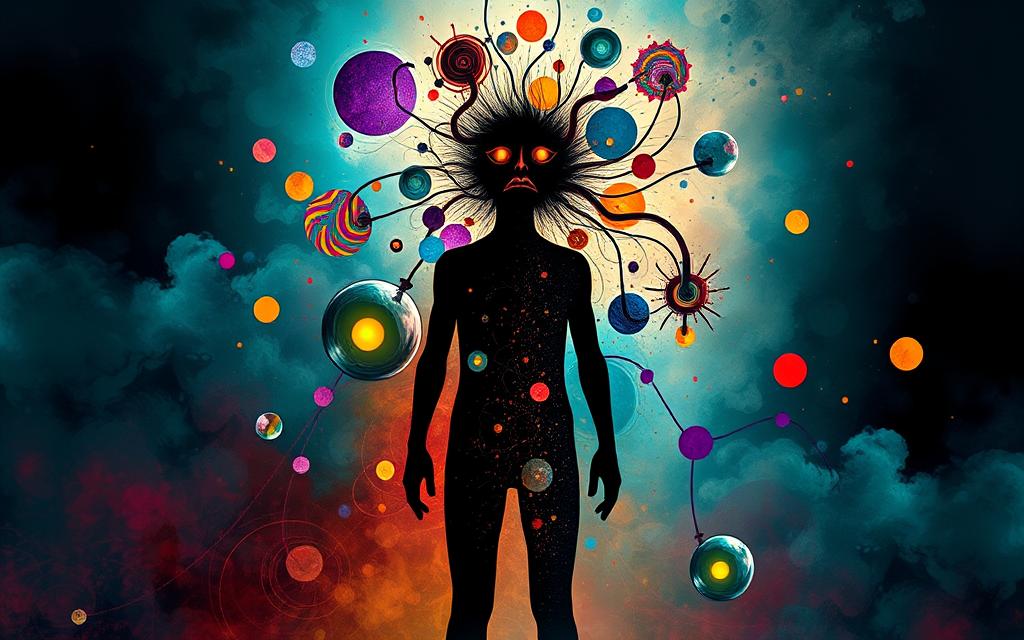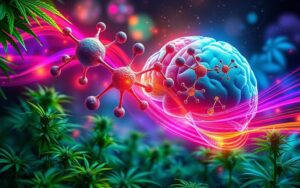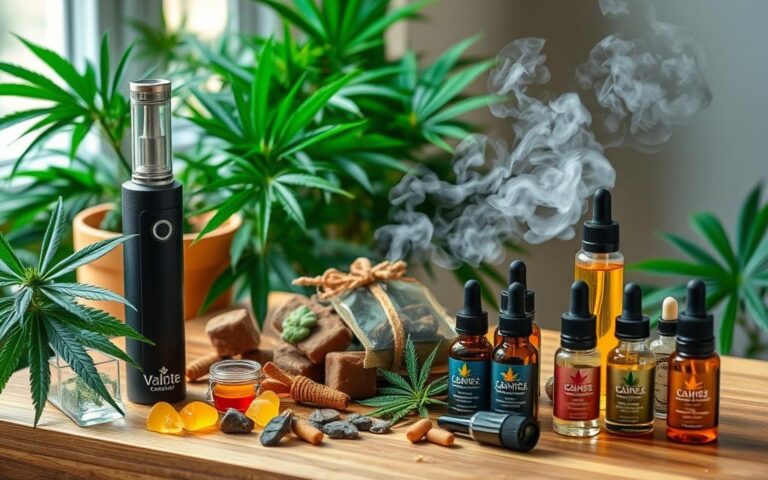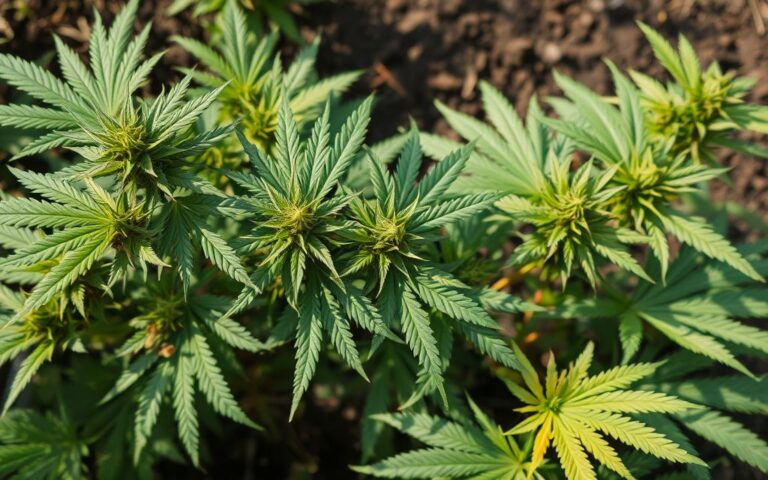Potential Risks of Using THCP
As the interest in cannabis and its derivatives grows, THCP stands out. It’s up to 30 times stronger than THC. This fact sparks debates on its side effects and safety.
Early research hints at possible benefits of THCP. Yet, the limited studies call for a deep dive into its risks. Knowing if THCP is bad for you is crucial. It binds to CB1 receptors 33 times more than THC, leading to strong effects even at small doses.
People have reported THCP side effects similar to THC. These include dry mouth, anxiety, and trouble thinking clearly. As knowledge of cannabis grows, knowing about THCP safety is key. An informed cannabis community ensures users have positive experiences.
Understanding THCP
Cannabis research is reaching new heights, uncovering compounds like tetrahydrocannabiphorol, or THCP. It’s a minor cannabinoid found in cannabis plants in tiny amounts, usually less than 0.1%. Despite this, THCP’s distinctive properties may make it a key player in cannabinoid research.
What is THCP?
THCP stands out because of its longer alkyl side chain, which has seven carbon atoms. This is more than the five in THC. Its unique structure means it binds more strongly to CB1 receptors. As a result, THCP could be up to 33 times more potent than THC. The properties of THCP might make its effects especially strong, offering users a more intense experience.
The Discovery and Extraction of THCP
A group of Italian researchers made an exciting discovery in late 2019. They found THCP in cannabis using advanced isolation techniques. With rising interest in THCP, new THCP extraction methods were developed. These methods mostly converted CBD into THCP synthetically, allowing for mass production. However, these methods raise concerns about the quality and safety of THCP on the market.
Choosing THCP products wisely is very important. Consumers should look for products from trusted sources. It’s also crucial to check for third-party testing and reports. For more detailed information, helpful cannabis blogs online can be consulted.
How THCP Interacts with the Body
To understand how THCP works in the body, we must look at the endocannabinoid system (ECS). This system helps control mood, memory, and appetite. It includes cannabinoid receptors, with CB1 and CB2 being key. THCP stands out because it can strongly bond to these receptors, hinting at its possible effects.
The Role of the Endocannabinoid System
The endocannabinoid system is vital for keeping the body balanced. THCP binds to the system’s receptors, especially the CB1 receptor in the brain. This can affect how we feel and see the world. Since THCP bonds more tightly than THC, it might have stronger effects, even in small amounts.
Comparing Binding Affinities: THCP vs. THC
How well cannabinoids connect with receptors is crucial. Studies show THCP’s connection to receptors is up to 33 times stronger than THC. This huge difference means THCP could have more powerful effects. This makes it interesting for future health uses. Below is a table comparing their affinities.
| Compound | Binding Affinity | Psychoactive Potential |
|---|---|---|
| THC | Low to Moderate | Moderate |
| THCP | High | High |
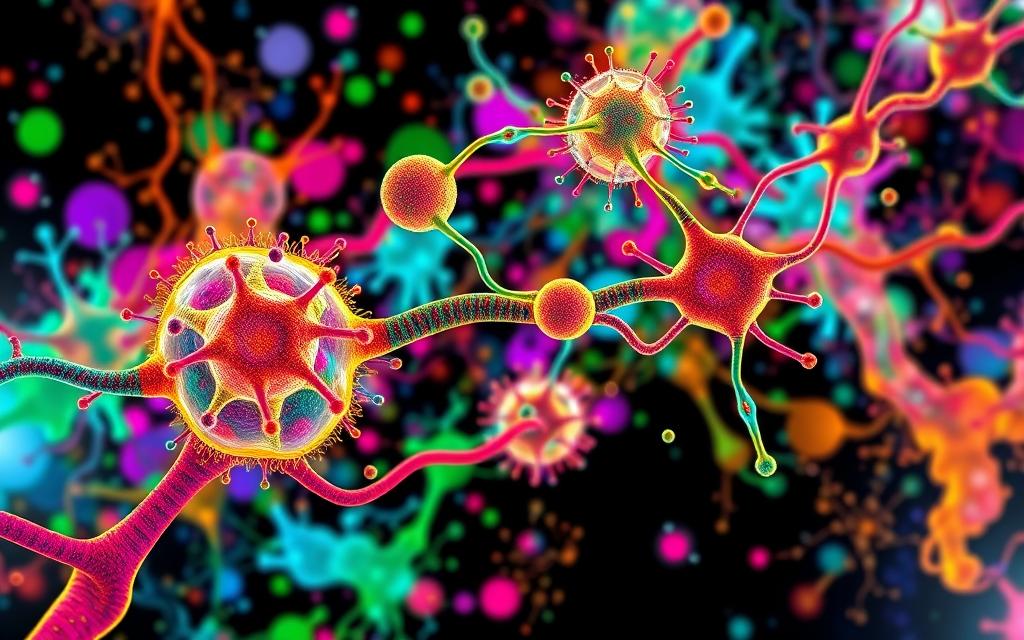
Potential Benefits of THCP
THCP is a new cannabinoid that’s gaining attention for its possible health and relief offerings. It shows promise in medical and immediate relief settings. Looking into THCP’s benefits involves exploring its medical potential and short-term effects.
Possible Therapeutic Applications
THCP could be more potent than regular THC, suggesting it might offer strong pain relief and anti-inflammation benefits. This means it could be a good alternative for those looking for something other than usual medicine. It binds well to cannabinoid receptors, which might mean it works well at smaller doses. This could help avoid the usual side effects of taking more THC.
THCP might help with:
- Management of chronic pain
- Alleviation of anxiety and mood disorders
- Support for conditions like insomnia
- Reduction of inflammation
Short-Term Uses of THCP
For short-term effects, people have said THCP can quickly reduce anxiety and boost mood. This fast action is useful in difficult times, offering relief and comfort. It’s becoming known for helping people relax and feel happy, especially after a tough day.
Key short-term benefits include:
- Rapid relief from anxiety symptoms
- Immediate pain management solutions
- Support in enhancing mood and relaxation
The potential of THCP for both therapy and pleasure is starting to be understood. However, to fully realise these benefits, more research and clinical tests are necessary. There’s a lot of promise for using THCP effectively and safely, for both medical and leisure purposes.
What are the Side Effects of THCP?
Interest in THCP is on the rise. Its effects are more potent than THC. This can lead to more intense side effects. People often feel different reactions, depending on how strong it is.
Common Side Effects Reported by Users
- Dry mouth
- Dizziness
- Rapid heart rate
- Mild drop in blood pressure
- Dry eyes
Side effects of THCP are similar to THC. But, taking more can worsen these effects. Each person reacts differently. So, knowing your limit is key.
Psychological and Physical Reactions
THCP can also affect your mind. Some feel more anxious or even paranoid with high doses. Its effects are stronger, so it’s wise to be careful with how much you use.
Research is uncovering more about THCP. Given its strength, caution is advised. Understanding its effects is essential, especially long-term.
| Dosage Level | Milligrams per Use | Typical Effects |
|---|---|---|
| Beginner | 3mg – 10mg | Mild relaxation, minimal side effects |
| Intermediate | 10mg – 20mg | Pronounced effects, potential mild side effects |
| Advanced | 20mg – 35mg+ | Strong psychoactive effects, risk of adverse reactions to THCP |
Is THCP Bad for You?
THCP was found in 2019 and it has sparked a lot of interest. Its strength is a big talking point. Being about 30 times stronger than THC means we need to be careful. People new to it might not know how it affects them more intensely.
Because of its strong bond with CB1 receptors in the brain, reactions can be stronger. This means the effects on both the mind and body could be too much for some.
The Implications of Increased Potency
The key question here is, could THCP be harmful? With its stronger effects, users might use less to feel the same as they would with THC. But this makes knowing the right amount to take tricky. And the side effects like anxiety and dizziness are similar to those from THC.
We need more studies to truly understand THCP. So, it’s best to be cautious and use it responsibly. Without clear information on its long-term impacts, taking it slow is wise.
Risks of Overconsumption
Because THCP is so powerful, there’s a higher chance of taking too much. New users might not realize and face worse effects. This could also lead to dependency issues.
As the cannabis industry grows, it’s important to keep everyone informed. Understanding the impacts and risks of these cannabinoids is crucial. This ensures the safety and wellbeing of users.
FAQ
What is THCP?
THCP, or tetrahydrocannabiphorol, is a new cannabinoid from cannabis. It could be 30 times stronger than THC because it has a special structure.
How was THCP discovered?
In 2019, Italian scientists found THCP. They used new methods to get it from cannabis, showing it’s not common.
How does THCP interact with the body?
THCP works with the endocannabinoid system, mainly connecting to CB1 receptors. This might change how we feel and what we sense.
What are the potential benefits of THCP?
Early research says THCP could help with pain and mood. It may work at lower doses than THC.
Are there side effects associated with THCP?
Yes, THCP can cause dry mouth, dizziness, and a fast heart rate. Using a lot might also lead to anxiety and paranoia.
Is THCP bad for you?
THCP’s strong effects are worrying. There’s a risk of taking too much and having bad reactions, especially for new users.
How does THCP’s potency compare to THC?
THCP can connect to cannabinoid receptors up to 33 times better than THC. This makes it much more psychoactive.
What should users be cautious about when consuming THCP?
When trying THCP, it’s important to watch how much you use. Too much could harm your mental and physical health.

